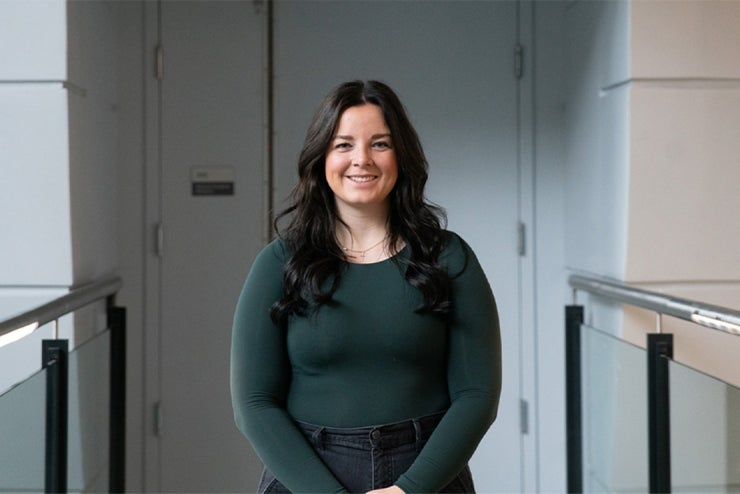
Stephanie Borlase developed a radiopharmaceutical, which will be used during a clinical trial at Sunnybrook Health Sciences Centre, to track delivery of immunotherapy drugs across the blood-brain barrier (photo by Dana Thompson)
A radiopharmaceutical developed by University of Toronto PhD student Stephanie Borlase is poised to play a key role in a clinical trial that could inform improvements to lung cancer treatment.
The trial at Sunnybrook Health Sciences Centre, planned for 2025, will test whether ultrasound can disrupt the blood-brain barrier and increase uptake of immunotherapy into brain metastases - tumours caused by cancer cells spreading to the brain from elsewhere in the body.
Although immunotherapy has shown potential as a treatment for lung cancer, it is not able to cross the blood-brain barrier. Borlase's radiopharmaceutical, which she developed as part of her doctoral research at the Leslie Dan Faculty of Pharmacy, will be used to track delivery of immunotherapy drugs to brain metastases with a PET (positron emission tomography) scan.
"This project provides me with the opportunity to learn different aspects of research and be on the forefront of patient treatments," says Borlase. "It is such an amazing opportunity to be able to see what is happening in the hospital with current patients and clinical trials and know that my research is actually getting to patients."
Borlase completed her undergraduate and master's degrees at the University of Manitoba, before seeking out a PhD program where she could conduct research that could potentially be translated into therapies for patients with hard-to-treat cancers.
In 2022, she began her PhD with Professor Raymond Reilly, director of the Centre for Pharmaceutical Oncology (CPO), whose research focuses on developing radiopharmaceuticals to image and treat cancer.
By attaching radioactive isotopes to highly targeted agents, radiopharmaceuticals allow clinicians to image tumours through scans and deliver therapeutic doses of radiation directly to the tumour.
Borlase has been working towards pairing the immunotherapy drug pembrolizumab (also known by the brand name Keytruda) with a radioactive isotope that can be imaged by PET - resulting in a radiopharmaceutical that could allow physicians to determine whether the therapy enters the brain and concentrates better in tumours after the application of focused ultrasound.
For the first two years of her PhD, Borlase worked in the CPO's Good Manufacturing Practices facility to prepare the new radiopharmaceutical for clinical trials, optimizing and formulating the drug in a quality suitable for use in humans, and testing it in pre-clinical models.
Reilly says that this is an exceptional experience for a graduate student. "One of the greatest impacts and rewards of pharmaceutical sciences research is to see your work advanced to a clinical trial to make a difference in patient outcomes, which Stephanie has this wonderful opportunity to do," he says.
"Not only is she developing the radiopharmaceutical, but she will be working closely with the oncologists and imaging specialists to design and conduct the trial and will get first-hand experience in seeing the results of her PhD research in the PET images of the patients in the trial."
The trial follows on the heels of another study in which clinicians and scientists at Sunnybrook used a radiopharmaceutical provided by Reilly's team to track the delivery of a breast cancer drug to brain metastases, resulting in the first evidence that the technique improved uptake of the drug.
For her part, Borlase says she hopes the trial will lead to better therapies for a form of cancer that is notoriously difficult to treat.
"I always hope that researchers can develop new treatments for cancer because it is such a terrible disease that is never going to disappear. Even if we cannot completely cure the brain metastases, we can work to prolong survival to give these individuals more time with their families and friends," says Borlase, who recently received a Research Training Award from the Canadian Cancer Society and Brain Canada Foundation.
"It's such a rare opportunity for PhD students to be able to work with clinician-scientists or oncologists and actually see their research translate into a clinical setting, so the fact that I am able to do this is incredible."













